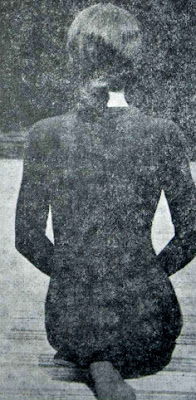Crossing the top of one foot across the Achilles tendon of the opposing foot is another version of Vajra Asana. The name of the position comes from the Sanskrit phrase "Gulpha," which means "ankle."
The pituitary and pineal glands in the brain activate reflex nerve terminals.
If doing this position causes aches, there is a glandular imbalance that can be resolved by continuing Gulpha Vajra Asana on a regular basis. When sitting in this position is no longer difficult or unpleasant, the disturbance has been rectified.
- Cross the top of one toot across the rear of the opposing ankle at the Achilles tendon, starting in Vajra Asana.
- Sit on the flat of the upturned toot that spans the opposite foot's ankle.
- While sitting in this position, practice deep breathing and trading your feet every three to six breaths.
Note: Because too much pressure is applied on one side of the body, the knees may deform somewhat in this position.
You may also want to read more about Yoga here.
You may also want to read more about Yoga Asanas and Exercises here.


